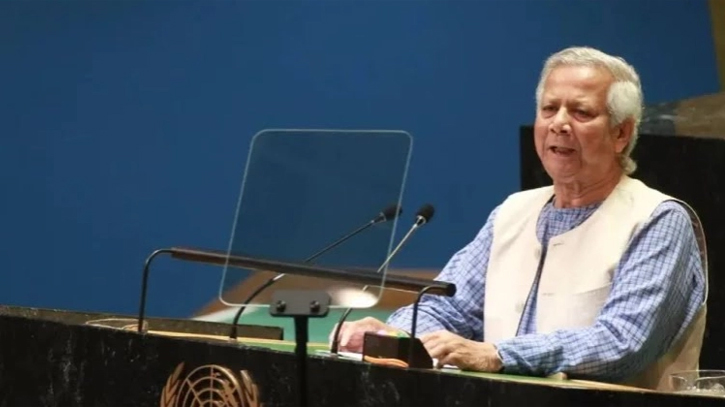
Photo: Collected
Chief Adviser Prof Muhammad Yunus on Tuesday said Bangladesh is willing to work with the ‘Climate Club’ to catalyse international cooperation in terms of capacity building, technology transfer and concessional decarbonisation finance.
“LDCs will need preferential treatment owing to their special circumstances and development needs,” he said while attending the high-level ‘Climate Club Leader’s Meeting’ jointly hosted by Germany and Chile on the sidelines of COP29, UN's biggest climate conference.
The Chief Adviser will deliver a speech at the opening session of the ‘World Leaders Climate Action Summit” at COP29 expectedly between 1:30 pm to 3:00 pm (Bangladesh time) on Wednesday.
The ‘Climate Club’ is an open and inclusive high-ambition intergovernmental forum for cooperation on accelerating industry decarbonisation.
Responding to a question, Prof Yunus said emissions-intensive production shifts to countries with less stringent climate policies, while potentially undermining global emissions reductions can impact competitiveness, with firms relocating operations to areas with lower environmental costs, leading to job losses in regions with stricter policies.
He said carbon leakage can dilute incentives for innovation in low-carbon technologies globally, as some sectors might prioritise cost over sustainable practices.
“To mitigate these risks, policies such as carbon border adjustments and international cooperation are essential to balance decarbonisation efforts with economic stability,” Prof Yunus said.
Conversely, he said, these policies can affect the competitiveness of the companies of particularly vulnerable developing countries like Bangladesh as strong emission policies will cause higher production costs, making them less competitive globally.
“Hence, preferential treatments are required for LDCs owing to their unique circumstances and development needs,” he said.
The Chief Adviser said advancing ambitious mitigation policies in a fragmented way is leading to emitting industrial activities moving to regions with less stringent or no carbon pricing policies, which leads to carbon leakage and thus may hamper the global goal of reducing overall global emissions.
Carbon Border Adjustment Mechanisms (CBAMs), as proposed by the EU, could incentivise countries to strengthen their climate policies by indirectly applying emissions standards to exported goods and prevent carbon leakage, he observed.
Prof Yunus said most vulnerable countries with limited decarbonisation capacity need to have adequate financial and technical support to develop green industries.
International collaboration is required to foster economic growth and create new job opportunities in emerging markets, supporting a just and inclusive transition, he said.
Responding to another question, Prof Yunus said dDeep, rapid and sustained reduction in GHG emissions and comprehensive international action are required for reducing global GHG emissions by 43% by 2030, reaching net-zero by 2050 to limit warming to 1.5°C.
To demonstrate and deploy proven low-emissions technologies, particularly in emerging markets and developing economies, where most industry investments are set to take place to respond to growing demand, including both the public and private sectors, he said.
“Many decarbonisation technologies require significant upfront investment. These high capital costs can be a barrier for industries, particularly in most vulnerable developing countries like Bangladesh, with limited access to financing,” said the Chief Adviser.
He laid emphasis on developing financial vehicles to finance the industrial decarbonisation fostering access to concessional finance for the private sector industries in the emerging developing economies like Bangladesh.
Prof Yunus called for an increased financial commitment for research and innovation.
“This can include national and international research programmes, in collaboration with the private sector and financial support from the developed countries will accelerate innovation and shared learning," said the CA.
He highlighted the importance of ensuring international cooperation, capacity building and technology transfer under Article 6.8 of the Paris Agreement.
Prof Yunus said international agreements on carbon pricing or border adjustment taxes will create a level playing field by imposing equivalent carbon costs on imports.
Messenger/Fameema








